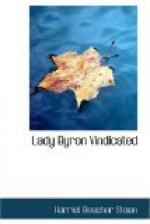But Lady Byron took no counsel with the world, nor with the literary men of her age. One knight, with some small remnant of England’s old chivalry, set lance in rest for her: she saw him beaten back unhorsed, rolled in the dust, and ingloriously vanquished, and perceived that henceforth nothing but injury could come to any one who attempted to speak for her.
She turned from the judgments of man and the fond and natural hopes of human nature, to lose herself in sacred ministries to the downcast and suffering. What nobler record for woman could there be than that which Miss Martineau has given?
Particularly to be noted in Lady Byron was her peculiar interest in reclaiming fallen women. Among her letters to Mrs. Prof. Follen, of Cambridge, was one addressed to a society of ladies who had undertaken this difficult work. It was full of heavenly wisdom and of a large and tolerant charity. Fenelon truly says, it is only perfection that can tolerate imperfection; and the very purity of Lady Byron’s nature made her most forbearing and most tender towards the weak and the guilty. This letter, with all the rest of Lady Byron’s, was returned to the hands of her executors after her death. Its publication would greatly assist the world in understanding the peculiarities of its writer’s character.
Lady Byron passed to a higher life in 1860. {105} After her death, I looked for the publication of her Memoir and Letters as the event that should give her the same opportunity of being known and judged by her life and writings that had been so freely accorded to Lord Byron.
She was, in her husband’s estimation, a woman of genius. She was the friend of many of the first men and women of her times, and corresponded with them on topics of literature, morals, religion, and, above all, on the benevolent and philanthropic movements of the day, whose principles she had studied with acute observation, and in connection with which she had acquired a large experience.
The knowledge of her, necessarily diffused by such a series of letters, would have created in America a comprehension of her character, of itself sufficient to wither a thousand slanders.
Such a Memoir was contemplated. Lady Byron’s letters to Mrs. Follen were asked for from Boston; and I was applied to by a person in England, who I have recently learned is one of the existing trustees of Lady Byron’s papers, to furnish copies of her letters to me for the purpose of a Memoir. Before I had time to have copies made, another letter came, stating that the trustees had concluded that it was best not to publish any Memoir of Lady Byron at all.
This left the character of Lady Byron in our American world precisely where the slanders of her husband, the literature of the Noctes Club, and the unanimous verdict of May Fair as recorded by ‘Blackwood,’ had placed it.
True, Lady Byron had nobly and quietly lived down these slanders in England by deeds that made her name revered as a saint among all those who valued saintliness.




